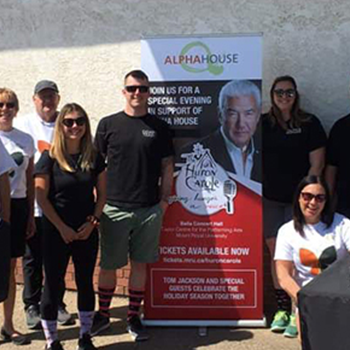Camping: It’s About Perspective
May 17, 2024 | Alpha House News News Opinion Piece

Let’s talk about camping! May long weekend is here, and we’ve got some thoughts to share as everyone gets ready to enjoy a weekend of family, fun, camping, BBQs, or other traditional long weekend activities.
Encampments and the challenges they pose for communities, the public, law enforcement, and governments has been an ongoing topic of discussion in Alberta these past many months and Alpha House is jumping into the conversation once again to talk PERSPECTIVE.
“Camping” is often thought of as a fun, mostly short-term activity that couples, families, and individuals partake in when they want a break from work or responsibilities and desire a reconnection with nature, fresh air, or simplicity (or maybe just an open area where their kids can run wild). But there is a lot of food for thought in the way we talk gleefully about an upcoming camping trip—about the pleasures it will bring—while simultaneously speaking ill of those for whom rough sleeping is a constant (often necessary) reality.
The pleasures and joys of camping—solitude, an inexpensive getaway, open country and fresh air, living by the land—are stated easily in casual conversation and accepted unquestioningly by most. Yet, the most frequently asked question when we talk about people who rough sleep or camp continuously rather than access shelters, is why on earth would someone choose to sleep outside?
The conversation is often – ‘there must be something wrong with shelters if someone is choosing to sleep outside instead.’ Speaking as an agency who meets people where they’re at without judgement, we know things are more complex than that. Shelters are an emergency response to (ideally) short-term crisis. They were neither created for nor expected to be for long-term comfort. Some people choose to stay outdoors because they feel more comfortable doing so because of trauma, anxiety, mental health, or simply personal preference in a choice that’s the lesser of two undesirable options.
Choosing to sleep outside, at least, if nothing else may be, is a relatable aspect of those who are about to head off to a campsite this summer and those individuals or couples who just setup a tarp and tent in the field near your house.
Camping can provide freedom and solitude and, when you have access to the tools and supplies you need, be relatively relaxing. Except, of course, when it feels like the only option on a seemingly endless road of being homeless; when staying warm with a fire is risky, when you haven’t showered in a few days, when you haven’t eaten anything hot in a week, when you’ve outstayed your welcome in the area and you have to pack up all your belongings and lug them off to find yet another temporary spot.
The reality is that what is challenging about camping – the preparation, the packing, the setup, the maintenance, the waste, the lack of access to things easily accessed in a home – is made more so by the circumstances of a person’s homelessness.
And what is rewarding about camping – the fresh air, the peace, the getaway, the freedom, is often made irrelevant by the circumstances of a person’s homelessness.
Encampments are not a solution to homelessness; they are a reality for those for whom going to a shelter is a challenging or upsetting prospect. We wish to see anyone who rough sleeps supported into housing that suits their needs and we wish to see camping become nothing but the hobby it’s about to be this summer for so many of you.
As we enjoy this May long weekend, our wish is for people to remember that rarely is anything as straightforward as it may seem. There is always room for perspective.
